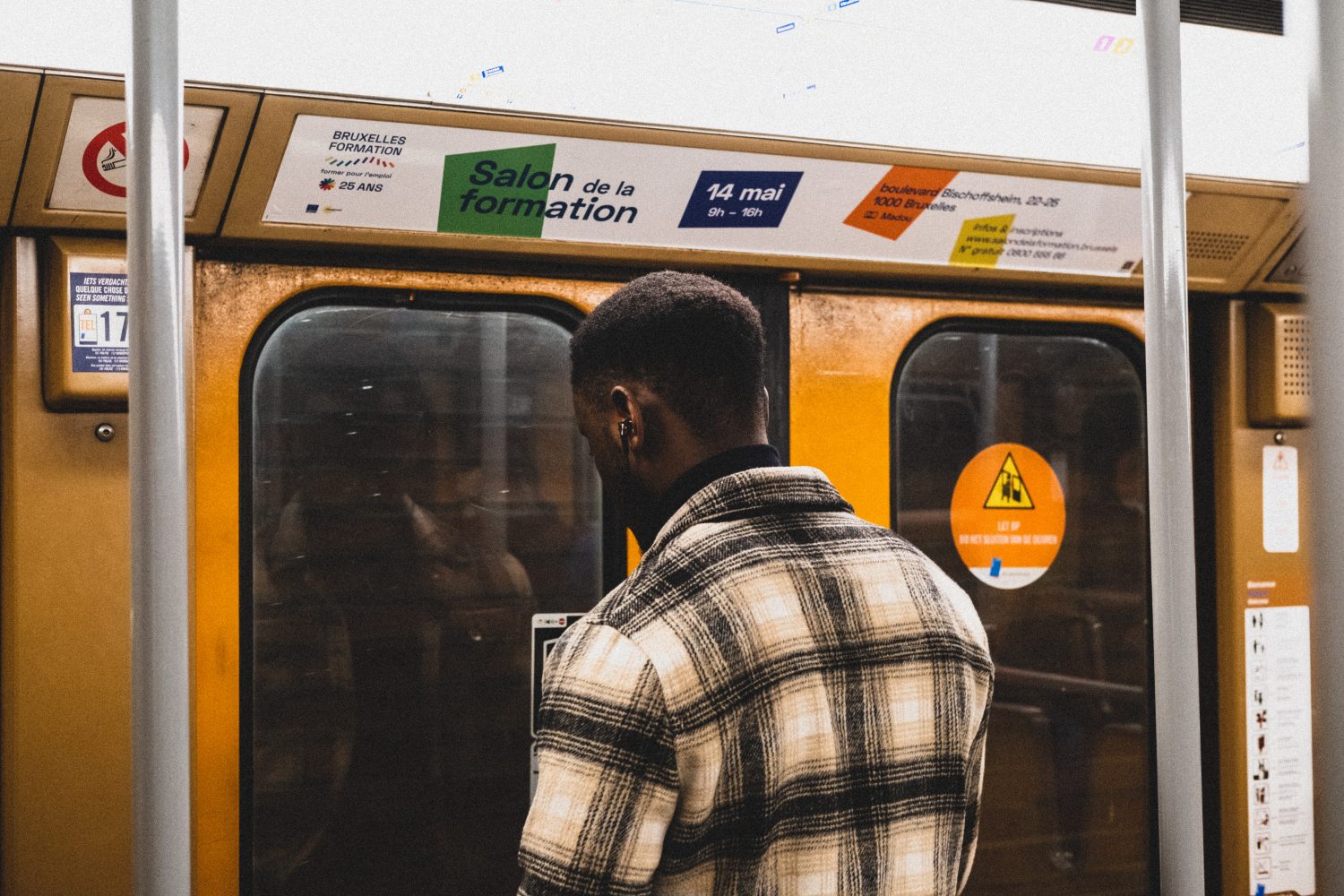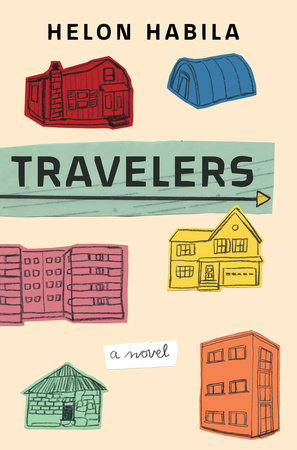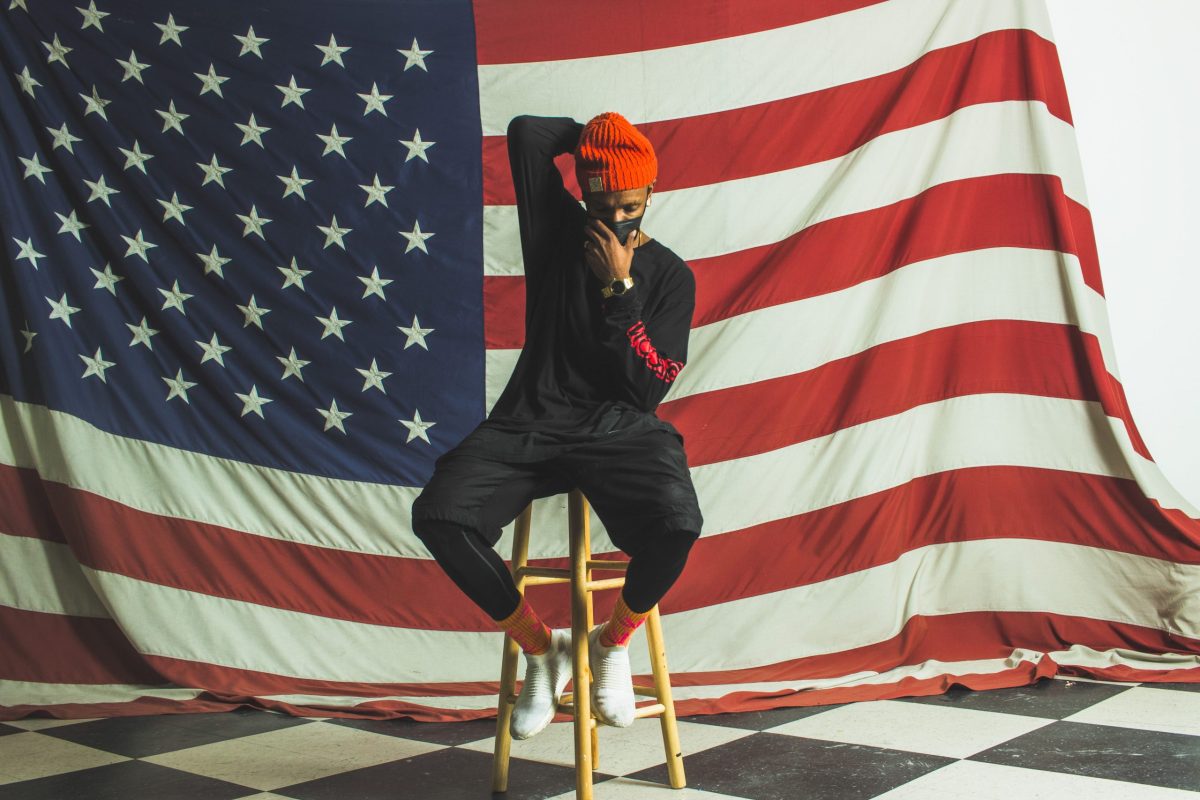interviews
Writing Is Always a Political Act
Helon Habila's novel "Travelers" fictionalizes the stories of the African migrants he encountered in Germany

In 2013, Helon Habila crossed paths with many migrants and refugees in Germany, some of whom had fled his home country Nigeria to escape the Boko Haram militancy that had displaced millions. Urged by these migrants to record their experiences, Helon Habila began his new novel in search of answers to his long-held questions about the meaning of home, if one could return to the home they’d fled, and the possibility of making a home away from home.
Travelers is a fictional record of the real and harrowing experiences of migrants fleeing certain death for uncertain survival in Europe. It follows the unnamed narrator, a Nigerian academic in Berlin—an expatriate really but for his skin color—who befriends a group of African refugees and their activist friends fighting for documentation and better life conditions. The slight advantage the narrator has over the African asylum seekers soon disappears when he misplaces his papers and accidentally boards a train heading for the refugee camps. In the camp, he learns how quickly lives can become displaced.
Kenechi Uzor: Your books have always struck me as interventive, political, always responding or reacting to some issue. Would you agree?
Helon Habila: We all write in reaction to something, what we often call the inspiration or the muse that triggers creativity. My muse happens to be more inclined towards social and political concerns, perhaps because of my history and the milieu in which I grew up in. In my country, and I guess in most other places, writing is always a very political act, it cannot afford not to be.
KU: “What is the point of art if it is not to resist?” How would you respond to this question posed by Mark, one of the characters in the Travelers?
In my country, and in most other places, writing is always a very political act, it cannot afford not to be.
HH: I think the best, and the most relevant writing, is always an act of protest. A refusal to keep quiet in the face of whatever seeks to dehumanize us—be it power, or oppression, or even simple lack of taste. Here I am referring especially to a long tradition of protest writing in Africa and other formerly colonized countries, and even in African American literatures—literatures described by Deleuz and Guttari as “minor literatures”—literatures subsisting within or underneath other, more dominant literatures, or within a dominant language. Such literatures, intentionally or otherwise, will always be political through their themes or aesthetics or use of language; such writers will always be seen as spokespersons for their community whether they like it or not. For such writers, to pretend not to be political will be futile.
KU: In the early pages of the book, the unnamed protagonist reflects on the “immigrant’s temperament,” the dilemma of wanting home and permanence in a new world but at the same time being reluctant and fearful of long-term commitments that could provide such permanence. I don’t think there’s been much conversation around this particular experience, at least not as much as the identity crisis that attends immigration.
HH: My image of the migrant is a person living out of a suitcase, with one foot always at the door, no matter how long he or she has lived in their new home. This image I guess is predicated on the trauma and uncertainty that always accompanies migration or exile—as Edward Said said, exile is compelling to think about, but painful to experience. This experience is manifested in many different ways, some over-compensate by embracing their new homes and not wanting to hear about the home they had left, associating it with all that is bad and evil; others can’t seem to feel at home in their new home, pining for their old country and never really making a life in the new place. This is what my character here calls his “immigrant’s temperament”—a permanent inability to fit in.
KU: In book 4, the narrator wonders why people etch their names in walls “only in places of bitterness and suffering and sweat” but never in “fancy hotels or restaurants or churches.” I’ve been thinking a lot about that and I’m wondering if you have some thoughts on this.
HH: Well, they say that suffering forms character, meaning you benefit more from adversity than you do from a lack of it. To survive adversity is to have proven something, it means to have been tested and to have survived that test. This on the surface of it, like most axioms, makes absolute sense, but in a way, I am also questioning this common assumption that suffering is good for us, while the truth is that we’d rather not suffer at all. Wars teach us to hate violence but think of all the dying and the privation we have to go through just to learn that lesson. That quote from the book links to another section where Gina, the main character’s wife, prefers to paint migrants whose bodies bear visible marks of their suffering. She refuses to paint Mark because his face is too smooth and unmarked by suffering. She thinks these markers of suffering makes them more interesting, and more convincing, but the truth is that these migrants would rather have stayed at home, in their countries, with their loved ones. That is the irony of it.
KU: Your novel made me rethink my idea of nostalgia as a wistful longing of pleasant past. A few of the refugees like Karim seem to reflect with longing for not only their pleasant past but also on the past that held their travails as refugees and asylum seekers. Is it still nostalgia if the reflections are of unpleasant experiences? Is this a phenomenon similar to Stockholm Syndrome? What is it about the human psyche that longs for a past suffering?
HH: I guess for most migrants nostalgia isn’t only for a past, it can also be for the present and for the future. They miss the present that they cannot share with their families and friends back home, they miss the future they will never witness with their childhood friends and their families.
If I were white I guess they’d call me an expatriate.
One of the best books I have read to this subject of nostalgia and migration is Eva Hoffman’s memoir, Lost in Translation. She grew up in Poland post-WWII. It was by no means a paradise, especially for a Jewish family having to deal with the vestiges of the WWII antisemitism and the new resurgence of it—yet, when her family finally leaves Poland and moves to Canada, she is heartbroken. She doesn’t remember all the privations and the antisemitism they faced in Warsaw, she only remembers the good times. Psychologists call this a dissociative mechanism. Because our mind is unable to cope with the pains of losing our home and the challenges of making a new home in an alien and often hostile place, it escapes to the past and paints a pleasant picture of the past, even the unpleasant past, rather than face the present.
KU: Language is often the first complication of traveling. In the refugee prison, where the segregation is by race and language, Karim’s two boys enjoy some privileges due to their ability to speak multiple languages. Can you speak a bit on the complication language brings to the immigrant experience?
HH: Language is the most common and the most effective tool humans have of expressing themselves, meaning of expressing their intelligence. Imagine if that is taken away from you. The characters in the camp have all been reduced to incoherence and even silence. I have often met adult migrants who—because they are not fluent in the new language, or because they speak with an accent, or because they cannot quickly understand a joke or cannot tell a joke—are looked upon as idiots. Sometimes, they have to depend on their children who are more fluent in the new language, to speak for them. And sometimes even their own children, who didn’t know who their parents were in their former life, begin to look upon their parents as not very smart.
In a way that is what I am playing with here, these adult characters have to rely on these kids to interpret this brave new world for them. For these kids the new world is not as frightening as it is for their parents because for them, it is normal, they have nothing to compare their situation with. They are fluent in the language of the present, whereas their parents are more fluent in the language of the past.
KU: Portia refers to her father, the resistant poet as a “professional exile” who “developed a taste for exile” and preferred to move from one asylum city to another rather than return home to his wife and daughter. Going by what happens to her father when he returns to Zambia, is the novel engaging with this idea that one can prefer and get so used to being in exile that returning home even in peacetime might not be the best for them?
HH: There are two types of exiles, those who never fit in and continuously hold on to the past, and the second are those that don’t want to hear about the past or the home they just left; instead they embrace the new home and overidealize it. Both are extreme cases, and both are dissociative mechanisms, they are not normal. James Kariku, Portia’s father, is on the end of the spectrum where exiles don’t want to hear about their home countries and even the family they left behind. In his case he has some justification, his country jailed him because of his political writing. He becomes a perpetual exile, a professional exile. Note that he is also an artist, a poet. Sometimes writers need that kind of opposition, even an imaginary one, to keep writing. A case in point is James Joyce, who kept alive his argument with Ireland and refused to go back or to hear anything good about Ireland; instead he decided to invent his own ideal city of Dublin, perhaps the way it used to be when he lived there. Clearly James Kariku can’t cope with the realities of the present, he can’t get over the slight done to him by his country and its rulers. He’d rather rot in exile than to go back—for people like him, to return is to die, both literally and figuratively.
KU: Travelers point to the plight of refugees and the need for activism and resistance to the world status quo, but it also seems to reinforce the hopelessness of the human condition. There is so much futility expressed through the experiences of Mark, Karim, Mousa, Portia, James Kariku, and the other characters that makes one wonder, like the narrator, if any change is possible, if there’s any point to resistance. Is futility the underlying theme of the novel?
HH: I must disagree that futility is the ruling sentiment in the book. I think most of the characters would look at themselves as heroes, they refused to lay down and die in their own countries, they refused to give in to tyranny and hopelessness, instead they took the risk to seek a new beginning in a new land. I also try to look at their motives for doing so—for most of them they do it because they love their families, they want their children to have a better future and they are willing to face humiliation and even death to achieve that.
These characters refused to give in to tyranny and hopelessness. Instead they took the risk to seek a new beginning in a new land.
Karim, the Somali character, leaves Mogadishu and enters exile because a warlord wants to marry his ten-year-old daughter. His options are to stay and watch his beloved daughter marry this crazed warlord or to run into an uncertain future, but a future that offers his daughter better odds than the one he is leaving behind. There are no easy choices. In a way I am interrogating a world order that has left some people so far behind, leaving them no option but to escape from their native homes. I don’t call their actions futile, I call it heroic.
KU: Travelers also engages with existentialism. Have you always been interested in existentialist concepts in your writing?
HH: If by existentialism you mean the search for meaning in a meaningless world, and the individual’s drive to survive at all cost, especially in a world that tries to stifle the individual impulse, I will say yes. My characters fight and resist “group-think,” sometimes rebelling against tradition because tradition should be a starting point, not a destination. It is there to guide us, and in the end, we have to find out what works for us and fight for that with all our resources.
KU: How has living and teaching in America influenced your writing? Would you have written a book like Travelers if you weren’t living outside Nigeria?
HH: I doubt I would have, or could have. Living outside one’s country gives one a deeper perspective into the discourse around travel and migration. There’s a sense of recognition I felt while talking to African migrants in Europe for the book—of course there are all sorts of migrants and travelers, my travel is less traumatic in the sense that I didn’t have to escape war or persecution, if I were white I guess they’d call me an expatriate, an expert in his field who is working in another country other than his. Migrant, refugee, émigré, expatriate—sometimes these terms are created to limit and confine. That is why I decided to go with Travelers, because in the end we are all traveling.
KU: Who should tell the immigrant story? Who can tell the immigrant story and tell it, right? Who should tell any story?
HH: Whoever is inspired or compelled by circumstance can tell it. It is not a competition. Migrant narratives are some of the oldest genre in literature. Think of the Odyssey, think of the Iliad, these are among the oldest western texts, and they are on travel. I guess we have come to associate the immigrant story with stories of black or brown people seeking refuge or opportunity in western countries. But the colonialists who went to Africa to conquer and to live there were also migrants, the experience is the same whether you are a soldier or a refugee, you still have to deal with the nostalgia of losing your native home, you all have to deal with the challenges of self-reinvention in a new place. It is the oldest story ever told or written: a man or woman goes on a journey, or a man or a woman comes to town.
KU: Some writers often say they have no readers in mind when they write. Is this the same for you? Who would you consider as the primary audience for Travelers?
HH: I really wasn’t thinking of any particular reader when I wrote it. All I wanted to do was to do justice to the people who entrusted me with their stories and to go beyond the statistics and the headlines and in the process to humanize them as much as possible.
KU: What problems, if any, have you noticed with how African writers have been telling their own stories? If we’ve been doing so, have we really been telling it different, or do we still propagate the same flaws we accuse foreign media and writers of doing?
HH: There isn’t any wrong way or right way of telling a story, as long as one does it with sincerity and humility. Each writer has his or her own approach to telling a story. I know I have in the past been uncomfortable with certain modes of representation of the African experience by African authors, but in the end I think it is a matter of style. Some writers are more subtle, some are more nuanced, some are less so. But if I were to offer an advice, I’d say we need to write more about our heroes and less about our villains and dictators, but the truth is that stories about villains are often more compelling than about good people. So, there you have it.









